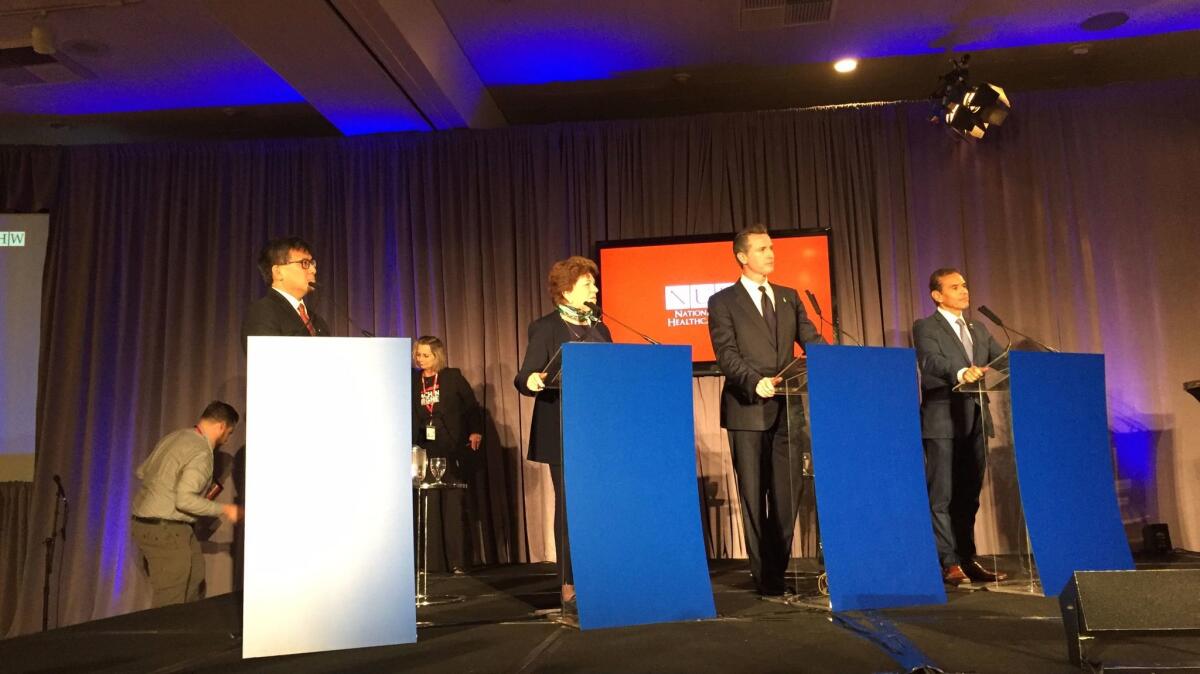Democrats running for California governor debate over bringing single-payer healthcare to the state

Reporting from Anaheim — The top four Democrats running for California governor stood onstage for the first major candidate forum Sunday, splintering over single-payer healthcare but little else.
The divide on healthcare mirrored the conflict within the Democratic Party both nationally and in California, with progressives — including those who backed Vermont Sen. Bernie Sanders for president — aggressively pushing for universal healthcare while moderates and establishment party members want to plot a more deliberative, cautious course.
On almost every other issue, from immigration to making housing more affordable in California, the four gubernatorial candidates aligned on Sunday. They remained cordial throughout the 90-minute exchange, taking only a few subtle digs at one another that would probably go unnoticed by voters paying only casual attention to the race.
The candidates each called for an increase in coverage for mental health and for holding healthcare companies more accountable. They threw sharp jabs at the Trump administration, vowing to take legal action to shield immigrants in California.
All four also lavished praise on organized labor, which was well received by the sponsor of the forum in Anaheim, the National Union of Healthcare Workers, an organization that has close to 14,000 members in California. Union president Sal Rosselli said the Republicans in the governor’s race were also invited but did not respond.
The exchange over state-sponsored single-payer healthcare, including shelved legislation in Sacramento that would have made the state responsible for paying all of the medical costs of Californians, offered a glimpse of the biggest contrast between the Democrats.
Former Los Angeles Mayor Antonio Villaraigosa said he supports the concept of a state single-payer system, but cautioned that politicians pushing for it were “selling snake oil” because they haven’t explained how to pay for it — the estimated cost is between $330 billion and $400 billion.
“When you’re governor, you’ve got to make the tough choices,” Villaraigosa said. “You can’t just say I want pie in the sky, because that doesn’t put food on people’s tables.”
Lt. Gov. Gavin Newsom, the current front-runner, dismissed those concerns. He said the next governor needs to show the political courage to tackle the issue. He cited a UCLA study that found Californians already pay an estimated $367.5 billion for healthcare through private insurance and public programs, with 70% of the cost borne by taxpayers.
“It’s a question of leadership. This is what they said about Social Security and Medicare — ‘You can’t do it,’’’ Newsom said. “The fact is the money exists in the system. The money is not being well invested. A single-payer system provides the ability to provide more efficiency and more cost controls … I’m not going to wait around for the debate to unfold in Washington, D.C.”
Former state schools chief Delanie Eastin was the only one to throw her full support behind the single-payer legislation in Sacramento. But she provided only general concepts about how the state would pay for it, citing a new gross receipts tax among her ideas.
“I’m not sure exactly. But it’s doable. We can do it if we put our minds to it,” Eastin said.
State Treasurer John Chiang, who is campaigning as a steward of fiscal responsibility and government transparency, was the most measured. He also favors universal healthcare, but suggests a slower approach to ensure it doesn’t swamp the state budget.
“We have to figure out how to scale up,” Chiang said. “We don’t have to go all in [and] provide all the services at once.”
After the debate, the union representatives in the audience cast their ballots to determine which candidate to endorse for the 2018 election.
When no one received more than 50% of the vote on the first ballot, a second vote was taken between the top two finishers: Newsom and Eastin.
Newsom received the endorsement.
Twitter: @philwillon
Updates on California politics
ALSO
More to Read
Get the L.A. Times Politics newsletter
Deeply reported insights into legislation, politics and policy from Sacramento, Washington and beyond. In your inbox three times per week.
You may occasionally receive promotional content from the Los Angeles Times.











